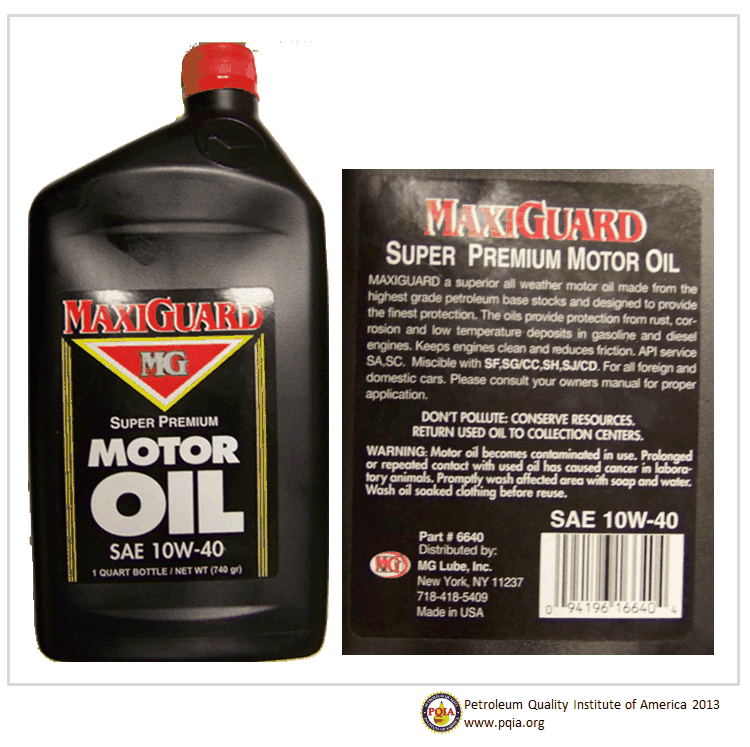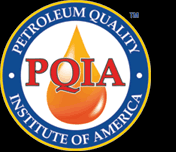PETROLEUM QUALITY INSTITUTE OF AMERICA TEST PROGRAM
The Petroleum Quality Institute of America (PQIA) is an independent resource for information and insights on the quality of lubricants in the marketplace. Our mission is to serve the consumer of lubricants by randomly sampling and independently testing lubricants taken from the field. Test results are posted along with the brand names on the PQIA website. Although laboratory tests alone cannot be used to establish if engine oil meets an API Service Category, they can be used to determine if it doesn't.
| MaxiGuard 10W-40, API SA,SC Motor Oil | |
 CLICK FOR LARGER IMAGE CLICK FOR LARGER IMAGE |
MaxiGuard10W-40, API SA,SC Motor Oil MG Lube Inc., NY, NY
Purchased in: Perth Amboy, NJ Date of purchase: 10/2013
CONSUMER ALERT - The labels on this product say "SAE 10W-40". PQIA's analysis of this sample shows the viscosity is actually 53% below the minimum requirement for a 10W-40 oil.
The back label
says API SA,SC. It is not possible for an oil
to comply with both API SA and SC, and this oil does
not comply with either. API SA and SC are old
obsolete specifications. The API cautions that
the SA specification is
"Not suitable for use in gasoline-powered automotive
engines built after 1930. Use in more modern engines
may cause unsatisfactory performance or equipment
harm", and
the SC specification is
"Not suitable
for use in gasoline-powered automotive engines built
after 1967. Use in more modern engines may cause
unsatisfactory performance or equipment harm". Their statement that this oil is "Miscible with SF, SG/CC,
SH, SJ/CD" means only that this oil mixes with other
oils meeting these specifications. PQIA's
analysis shows this oil does not comply with any of
these other specifications. Finally, their
statement "For all foreign and domestic cars" is not
true as this oil is unsuitable for use in almost all
foreign and domestic cars. In addition, PQIA's analysis shows extremely high levels of silicon, which is often associated with abrasive contamination, and the high levels of iron, aluminum, and potassium indicate this product likely contains used oil. |
| PHYSICAL TESTS | Standard | Typical-e | MaxiGuard |
| TBN, mg KOH/g, (ASTM D2896) | 6.1 to 8.3 | 0.3 | |
| Viscosity @ 100ºC, cSt, (ASTM D445) | 12.5 to 16.3 | 5.783 | |
| Viscosity @ 40ºC, cSt, ASTM D445 | 33.40 | ||
| Viscosity Index (ASTM D2270) | 115 | ||
| Viscosity @ -25ºC mPa s (cP) (ASTM D5293) | 6,600 Max | 3,550 | |
| ELEMENTAL ANALYSIS-c | |||
| Additives | |||
| Calcium | 1,570 to 2,360 | 67 | |
| Magnesium, ppm | 6 to 46 | 1 | |
| Phosphorus, ppm | 600 to 800 | 110 | |
| Zinc, ppm | 766 to 868 | 31 | |
| Molybdenum, ppm | <1 to 269 | <1 | |
| Barium, ppm | <1 | <1 | |
| Boron, ppm | <1 to 237 | 2 | |
| Silicon, ppm-d | 2 to 9 | 435 | |
| Potassium, ppm | 9 to 17 | 18 | |
| Manganese, ppm | <1 | <1 | |
| Titanium, ppm | <1 to 114 | <1 | |
| Copper, ppm | <1 | <1 | |
| Sodium, ppm | 5 to 454 | 3 | |
| Vanadium, ppm | <1 | <1 | |
| Contaminants | |||
| Silver, ppm | <1 | <1 | |
| Aluminum, ppm | <1 to 3 | 50 | |
| Chromium, ppm | <1 | <1 | |
| Iron, ppm | <1 to 1 | 13 | |
| Nickel, ppm | <1 | <1 | |
| Lead, ppm | <1 | <1 | |
| Antimony, ppm | <1 | <1 | |
| Tin, ppm | <1 | <1 | |
|
a- Click here for product label. b- Standards, shown in yellow are established by API, SAE and others. c-Test Method for metal analysis is ASTM ASTM D5185. d- Although silicon is used as an antifoam additive in lubricants, concentrations above 7ppm have been linked to contamination from abrasive material, e- Values typically seen in motor oils meeting the current API SN/GF-5 specification. |
|||
| FRONT AND BACK LABELS FROM PRODUCT TESTED | ||||
|
|
|||
|
|
|
|||

